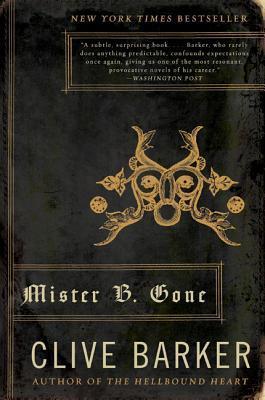
Mister B. Gone
Book Description
A chilling whisper beckons from the shadows, a demon has escaped his infernal prison, and he’s eager to share his dark tale. Mister B. is not just a harbinger of terror; he’s a twisted storyteller, drawing readers into a captivating world of pain, desire, and unimaginable horror. As he spins his web of seduction and dread, the line between reality and nightmare blurs, leaving hearts racing and minds reeling. With every page turned, the stakes rise, revealing secrets that could unravel existence itself. Will you dare to listen to the echoes of his wickedness?
Quick Book Summary
"Mister B. Gone" by Clive Barker is a chilling, metafictional horror novel that invites the reader into a macabre conversation with Jakabok Botch—or Mister B—a minor demon who claws his way out of hell into the human world. Narrating directly to the audience, Mister B. pleads, threatens, and seduces them to burn the very book they’re holding. Through his harrowing autobiography, he details his traumatic demonic childhood, rebellions in hell, and hellish escapades aboveground during the late Middle Ages. The twisted demon reveals intimate secrets of both infernal and mortal worlds, all while sinister cosmic forces conspire with Mister B. to ensure the continued survival of the book itself. Ultimately, it is an unnerving experience, blurring the line between fiction and reality, while probing the infectious powers of storytelling, temptation, and damnation.
Summary of Key Ideas
Table of Contents
The Unreliable and Manipulative Narration of Jakabok Botch
The narrative of "Mister B. Gone" draws readers into an immediately unsettling relationship with its narrator, Jakabok Botch, a demon who speaks directly to the reader. From the outset, Mister B. begs the audience to burn the book, invoking a sense of complicity and foreboding dread. This manipulative narration disrupts traditional storytelling, as Mister B. alternates between threats, humor, and desperate pleas in an effort to gain the reader’s compliance. The demonic voice is compelling, making the reader an active participant in the unfolding horror rather than a passive observer.
The Blurring of Reality and Storytelling
Mister B.'s own life story is one of torment and violence. Born to brutal tormentors and raised in the pitiless depths of hell, Jakabok endures abuse and deformity, which fuel his bitterness and ambition. His escape to the human world serves as both liberation and damnation, as he discovers new mortal frailties and temptations. The late medieval setting, rife with superstition and intellectual awakening, becomes the stage for his macabre adventures, revealing how hell and Earth mirror each other’s cruelty and desire for dominance.
The Nature of Damnation and Desire
As Mister B. journeys through the world, he forges an uneasy alliance with another demon, which tests his capacity for trust, envy, and betrayal. Together, they become entangled in a cosmic conspiracy involving the secret creation of a Gutenberg-like printing press, hinting at the inherent danger and transformative power of books. This alliance exposes Mister B. to the intoxicating draw of knowledge, ambition, and the eternal struggle between destruction and creation.
The Corrupting Influence of Power and Knowledge
Throughout the narrative, the theme of meta-fiction looms large. Mister B.'s persistent pleas to burn the book fragment the boundaries between fiction and reality, inviting readers to question the truth of the story and their role within it. The book itself becomes both a cursed object and an embodiment of forbidden knowledge, challenging notions of agency, complicity, and the consequences of indulging dark curiosities.
Meta-commentary on Books and Forbidden Stories
In the end, "Mister B. Gone" becomes a meditation on the allure and danger of stories—especially those that should never be told. Mister B.’s tale is both a warning and a temptation, suggesting that simply reading is an act fraught with risk, capable of inviting corruption and unleashing ancient evils. Clive Barker’s novel thus functions on multiple levels: as a chilling horror story, a commentary on narrative seduction, and a cautionary tale about the seductive power of the written word.
Download This Summary
Get a free PDF of this summary instantly — no email required.





